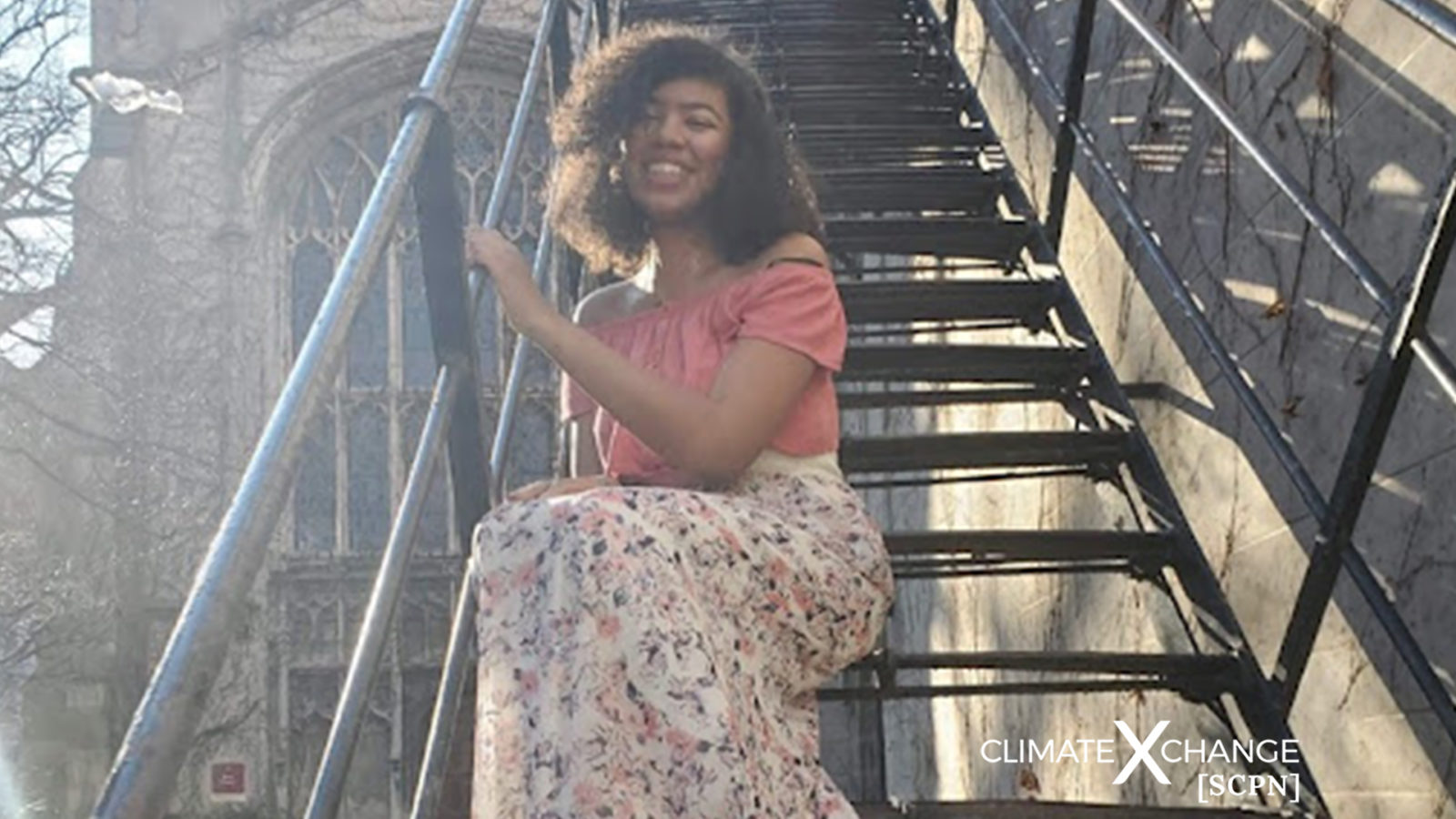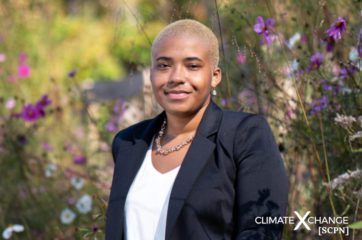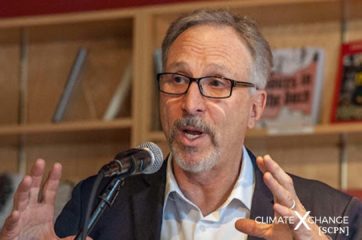All across the country, members of our State Climate Policy Network (SCPN) are fighting to make an impact on climate change in their communities. We have individuals in our Network from all 50 states, each experiencing climate change differently in their local areas and finding unique solutions to build resiliency efforts.
Kendall Chappell is a member of the youth-led campaign Change the Chamber/Lobby for Climate, where she has been a core volunteer since 2020. In her work, she tackles the anti-climate lobbying of the largest dark money, pro-fossil fuel group in the country: the U.S. Chamber of Commerce. While keeping her sights on law school in the near future, she is currently a student at the University of Chicago pursuing a Bachelor’s degree in Environmental Science with a minor in English.
This interview has been lightly edited for clarity and brevity.
Nina Jacobs
Kendall, thanks so much for being here with me today! I’ve had a lot of fun collaborating with you over the past year, and I’d love to hear how you got involved as a youth climate activist. What motivated you to become involved in the climate sphere and educate yourself on what is a very daunting topic?
Kendall Chappell
I’ve always been interested in environmental science. When I was in elementary school, I was interested in weather science and wanted to be a storm chaser. When I got to high school, I became more interested in environmental law and joined the mock trial team. Seeing the climate marches and other youth activists really inspired me to become more involved in the activist arena. Another thing that stood out to me was an international environmental policy class where my professor showed us a poll about how voters viewed the topic of climate change. It suggested that a majority of people support climate action and believe climate change is real, but their congressional representatives didn’t hold those same beliefs. There was a clear disconnect between the people and their representatives, and that irritated me. So I started looking for organizations where I could do something about that.
Nina Jacobs
Speaking of those organizations, let’s talk about Change the Chamber where you’re a core volunteer. Thinking back over the past year, what are some of the successes and challenges you’ve experienced in helping organize campaigns that are gaining momentum in the media and among members of Congress?
Kendall Chappell
One of the biggest challenges is that, since the majority of us are students with conflicting schedules, it becomes difficult to organize everyone. But I think it’s worked out because everyone is passionate about the organization and continues to participate. One of our biggest wins is the Chamber publicly supporting a price on carbon. Our successes have happened because we’re a persistent group, especially in how we communicate with senators and representatives of the Chamber and their member companies. We haven’t always been successful in our outreach, but there’s always someone or some company that hears us and truly listens. That has taught us a valuable lesson on persistence.
Nina Jacobs
I agree that it can be daunting to communicate with big corporations, but if we can get one to listen to us and change their relationship with the Chamber, that’s a big win. As we continue to talk about the Chamber, why do you think it’s important for our generation to become aware of the U.S. Chamber of Commerce? What is it about trade associations that concerns you, and what is most important for youth to realize about these types of groups?
Kendall Chappell
What concerns me the most is that they claim to represent businesses and the interests of consumers, but their lobbying proves that they don’t. I also believe they have a lot more power than they should have. They work closely with many senators and members of Congress to the point that the wellbeing of the American people is overlooked and even disregarded. That connection really needs to be called out.
Nina Jacobs
It’s a very dangerous loop when you think about it. These trade associations donate to certain members of Congress, who then push the agenda of big business. This creates such a problematic cycle. I also agree that the Chamber is out of step with how many of these corporations are viewing the climate crisis. If these businesses claim to be more progressive than the Chamber itself, then it’s time they take a stand. Could you talk more about your work within Change the Chamber. You participate in a lot of different areas within the campaign, including research, legal, and environmental justice. What makes you interested in these topics?
Kendall Chappell
I didn’t know much about the topic of environmental justice until my second year of college. It seemed really basic to me — of course everyone deserves clean air and water. But the environmental justice movement is important because not everyone has those human rights recognized. After I joined Change the Chamber, I wanted to do as much as I could to highlight that. I’m also interested in environmental law. I feel the biggest way to protect pro-climate policy is through the legal system, because if law is not enforced then there really is no point in creating it. And in terms of research, it’s very interesting to learn about dark money and the anti-climate history of trade associations.
Nina Jacobs
You are one of the founding members of the environmental justice team in the Change the Chamber campaign. Why do you feel that it’s important to have that perspective within this campaign in particular?
Kendall Chappell
It’s easy to overlook environmental justice, especially within a group that specifically focuses on the Chamber. The Chamber’s anti-climate lobbying ultimately impacts lower-income and minority communities the most, and these demographics are the ones that are already affected disproportionately by climate change. The Chamber is helping the rich get richer at the expense of others. It’s important that while our group focuses on holding the Chamber accountable, we are also uplifting the voices of the communities who are most hurt by their actions.
Nina Jacobs
Are you a part of any other organizations or projects of yours that you would like to mention? If so, do you see your interest in the environment reflected in those?
Kendall Chappell
Last year, I interned with the Earth Law Center, which was interesting because it took an approach to law which argued that the environment has its own rights. It gave me a new perspective when thinking about the environment and how it’s protected by law. Ecocentric approaches are becoming more popular, especially under the current President, and we may see this perspective appear more often in law and policy. I also volunteered with the Sustainable Politician Project, which works towards electing congressmen who have strong environmental records. People may care about the environment, but not always vote based on it. This was a way to help educate voters who may not have researched a candidate’s stance on climate issues.
Nina Jacobs
What are you most looking forward to in terms of your climate advocacy in 2021?
Kendall Chappell
First off, I’m very excited to continue with Change the Chamber and to see where we go from here, especially during the first year of the Biden administration. We have already seen a lot of change within the Chamber, and hopefully that will continue. I also plan on applying for law school this year which will allow me to have more legal experience than I could have as an undergraduate. This summer, I’m interning in the U.S. Department of Justice’s Environmental Crimes section, and I’m excited to learn about the environment from this new perspective.
Nina Jacobs
Kendall, thank you so much for taking the time to be here with me. I’m glad I got the chance to learn more about your passions and what led you to where you are today. I’m so excited to see what the future holds for you.









